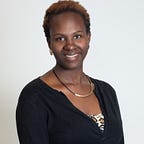Ahmaud Arbery Is Every Black Mother’s Son
Ahmaud. He has one of those names that make nurses pause in the waiting room, wondering if they are pronouncing it right. A Black name. A name like my son’s and even though they are 24 years a part as of last week, when I look at photos of Ahmaud I see him so clearly. The moment my son, Isan was born I stared deeply into his eyes wondering what his life would be like. I wondered if he would be left or right-handed, like sports or the arts, be stubborn or compliant, but more than anything I wondered how this world would treat him.
This thought is not uncommon for the more than 600,000 Black mothers who live in this country. Yet, it still feels unfair. In addition to worrying about broken bones and bullies, I have to worry about whether or not my only son will live to see adulthood. When other families are having “the talk” about sex, I will likely be having a much different conversation- a necessary conversation about survival.
Despite trying to keep my son safe and out of harm’s way, while teaching him how to be a loving and respectable human being, the reality is that I cannot protect him from others’ hatred. It’s heartbreaking, infuriating, and is the kind of worry that keeps me up at night. Especially when I see it happening to other people’s innocent children who could easily be my own.
I think positively and pray for my son everyday. But the worry that I speak of doesn’t go away. When I see images of Trayvon, Sean, Tamir, and now Ahmaud I am reminded of the harsh realities that Black boys face and I think about what it must feel like to be their mothers.
It has been hard to sleep since the video leading up to Ahmaud’s death surfaced, so instead I watch Isan sleep. He is so peaceful and perfect when he curls into a ball in the center of my bed. His breathing is calm and watching him, I am at peace, because I know that he’s protected. I know that as a two-year-old my bed symbolizes safety from the imaginary monsters lurking in the dark. I know my nearness helps him feel nurtured and loved. I stare at him for as long as I can, because I don’t know how much longer he will retreat to my bed. I don’t know how much longer he will know where to go to feel safe. I don’t know if he will always have a way out.
But what I do know is that I will continue to raise a strong son, like so many Black mothers do, who will be proud of who he is and hopefully stand up for himself in the face of injustice. I will continue to raise a son, who appreciates life and is keenly aware of its fragility. I will raise a son who knows right from wrong and doesn’t judge others or himself when he makes poor choices.
What I want most for my son is something that I have to come to terms with not being able to give him. More than anything, I want my child to be free. I want him to be able to put on his running shoes and jog off into the distance without worrying that his life is in jeopardy, without worrying if he is strong enough to put up a fight and wise enough to change the narrative.
I want the full experience of being able to be a mother to my son. I don’t want my son to be a martyr for a movement that shouldn’t have to exist in the first place. Like so many mothers, I want my son to exist in the world as his authentic self.
